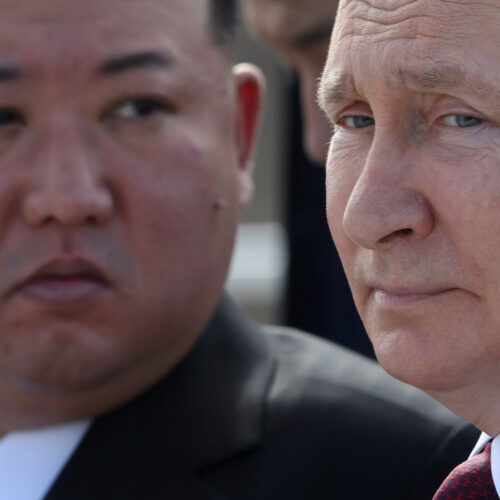Trump’s Long Legacy of Inciting Violence
As Donald Trump campaigns to be a dictator for one day, he’s asking: “Are you better off now than you were when I was president?” Great question! To help answer it, our Trump Files series is delving into consequential events from the 45th president’s time in office that Americans might have forgotten—or wish they had.
It was no surprise. Instead, call it the October reveal.
In the final days of the 2024 election, ugly rhetoric from Donald Trump’s campaign drew major national attention when a speaker made a racist joke about Puerto Rico as part of the ex-president’s Oct. 27 rally at Madison Square Garden. The event was an inevitable culmination for the Trump campaign, a six-hour pageant of divisiveness and bigotry that featured multiple speakers launching racist and misogynistic attacks on Kamala Harris. It concluded with Trump at the podium delivering the same demagoguery he has used in dozens of rallies this year: painting a wildly exaggerated picture of national decay, promoting baseless conspiracy theories, and stoking fear and anger about an alleged “invasion” of America by murderous migrants.
Such themes have been at the dark heart of Trump’s politics ever since he entered the presidential race nearly a decade ago. As he has taken these tactics to new extremes over the past few months, law enforcement and national security sources I’ve spoken with have warned about a growing danger of far-right political violence inspired by Trump’s messaging.
The pattern is clear: Trump’s extreme rhetoric is deliberate.
This is not theoretical. It’s based on a lengthy history of violence associated with Trump’s rhetoric, which by 2021 led a bipartisan group of top national security experts to take the extraordinary step of labeling Trump, effectively, a terrorist leader—the de facto head of a violent extremist movement within the United States.
Given that another central tactic of Trumpism is to try to cover up the truth and push anything damaging down the memory hole, the time is ripe to revisit some of the major violence coinciding with Trump’s incitement. I’ve been documenting these grim events for more than six years.
As I reported in an investigation begun in summer 2018, white supremacist attacks grew deadlier during Trump’s tenure in the White House. The violence unfolded amid a surge in far-right plots and threats, according to law enforcement sources I spoke with then. That included a wave of menace specifically targeting journalists, who Trump and his allies smeared repeatedly as “the enemy of the American people.” Two devastating mass shootings—one at a synagogue in Pittsburgh and another at a Walmart in El Paso, Texas—involved perpetrators who were focused on a migrant “invasion,” a core theme also emphasized back then by Trump. The echoes of Trump’s rhetoric in the El Paso case were particularly stark, as I detailed again recently:
The gunman had driven to the border city from 650 miles away. In custody, he told police he’d come to kill Mexicans. Some writings he’d posted online said his attack was “a response to the Hispanic invasion of Texas” and that his mission was “defending my country from cultural and ethnic replacement brought on by an invasion.” He cited an extremist ideology known as “The Great Replacement.”
These were not obscure ideas. The gunman wrote that he agreed with a recent mass shooter in New Zealand who had espoused them. He also knew some of these themes were being championed at the time by President Donald Trump. With help from Fox News pundits, Trump was whipping up fear and hatred of an alleged “invasion” coming across America’s southern border—the message was central to Trump’s reelection campaign in 2019, a focus of his ads and speeches warning ominously of a national demise.
At the end of the shooter’s screed posted online, he sought to validate his attack with a pseudo-clever twist, suggesting that his views predated Trump in the White House. “I know that the media will probably call me a white supremacist anyway and blame Trump’s rhetoric,” he wrote. Then he used Trump’s own rhetoric as supporting ammo: “The media is infamous for fake news.”
Notably, Trump backer Tucker Carlson, who has long pushed Great Replacement themes, alluded to the ideology again in his caustic speech at the Madison Square Garden rally. And Trump’s biggest financial backer, Elon Musk, has also been emphasizing it down the campaign homestretch.
Most infamously, of course, Trump’s incitement provoked the brutal insurrection at the US Capitol on Jan. 6, 2021. The former president and his allies have spent the years since then trying to erase the truth about Trump’s indelible role in motivating that unprecedented attack on American democracy.
Numerous Republican Party leaders have consistently helped deny, justify, and cover up Trump’s incitement of political violence, and some have since adopted his tactics. Others, including House Speaker Mike Johnson, have just played dumb. As one national security source told me recently, “Silence is its own form of participation.”
Trump continues to weave his virulent strands of demagoguery into a grand conspiracy theory alleging the election will be “stolen” from him. As I reported in late October, the further escalation of his extreme rhetoric has been accompanied by a rise in violent threats reflecting his messaging. With the 2024 voting results imminent, the question now is where this defining feature of Trumpism may take us next.




 NON-CITIZENS REGISTERED IN GA
NON-CITIZENS REGISTERED IN GA